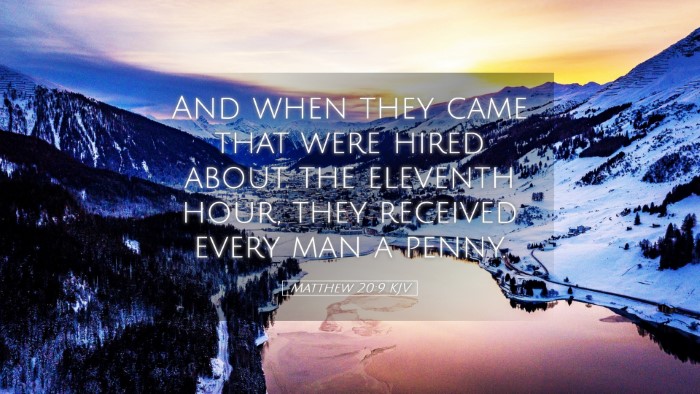Commentary on Matthew 20:9
The verse Matthew 20:9 states, “And when those came who were hired around the eleventh hour, they received a denarius each.” This verse is part of the parable of the laborers in the vineyard, which illustrates profound truths about the Kingdom of Heaven and God’s grace.
Context of the Parable
This parable is found in the context of Jesus’ teachings on the Kingdom of Heaven, which often challenge conventional notions of justice, fairness, and reward. Matthew Henry notes that the parable exposes the self-righteous attitudes of the Jewish leaders and serves as a comfort to the marginalized and those feeling they do not measure up to standard expectations.
Insights from Early Hires
- God’s Generosity: The landowner in the parable represents God, whose goodness and generosity are highlighted by giving equal pay to all workers regardless of the hours they worked. Albert Barnes explains that this symbolizes the grace of God, given freely to all who receive it, regardless of when they come to faith.
- Egalitarian Theme: Adam Clarke emphasizes that this parable demolishes typical human expectations regarding merit and reward. It suggests that in God's economy, the last will be first, and the first will be last, reflecting a radical economy of grace.
Last-Hour Workers
The phrase "those who were hired around the eleventh hour" directs attention to the latecomers in the vineyard, a metaphor for sinners coming to the faith later in life. Matthew Henry discusses the implications of their late arrival, highlighting God’s mercy in calling even those who seem least deserving to His service.
Early interpreters have noted that each worker receiving a denarius illustrates the concept that salvation is not earned but given, a theme echoed throughout Paul’s letters. This emphasizes God's invitation to salvation being available until the last moments of life.
The Nature of Divine Grace
Understanding the implications of grace is crucial for both theologians and lay readers. Barnes points out that this parable encapsulates the notion that all believers receive God’s grace; therefore, there is no ground for boasting among those who come early or late. Each believer is equally precious in God’s sight, regardless of their past.
Clarke concludes that this parable reflects the Christian doctrine of faith, highlighting that entrance into the Kingdom of Heaven is based on divine mercy rather than human merit, leveling the playing field for all who believe.
Theological Implications
- Salvation History: This verse serves as a reminder of God’s patience and the expansive nature of His redemption, emphasizing that no one is beyond the reach of God’s grace.
- Justice vs. Grace: The juxtaposition of justice and grace is pivotal in interpreting this parable. What is seen as unfair by human standards reflects a divine principle that values mercy over strict justice.
Encouragement for Believers
This teaching encourages believers, especially those who feel they have been ‘latecomers’ in their faith, assuring them that they are welcomed into the Kingdom. The Church, as the vineyard, is a place for all who accept the invitation, regardless of their past or how late they arrive.
Matthew Henry highlights that this parable is meant to strengthen believers, fostering an understanding that God’s grace is abundant and reaches all who genuinely seek it.
Conclusion
Matthew 20:9 provides rich insights that challenge traditional views on fairness and justice, encouraging a deeper understanding of God's grace. Scholars and pastors alike can draw upon this parable to explain the nature of salvation, the unearned favor of God, and the radical inclusivity of the Gospel.
In summary, this verse, situated within the larger framework of Jesus’ teachings, continues to serve as a profound reminder of God's unmerited favor, offering hope to all, regardless of when they come to faith.


